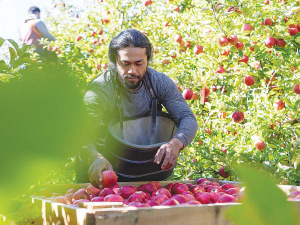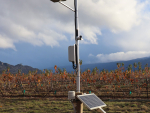Apple and pear growers around the country have slammed the Government's handling of the overseas workers who pick a substantial amount of NZ's apple crop each year.
Richard Punter, chairman of Apple and Pears NZ, says the Government simply doesn't understand the role performed by these people, who work under the RSE or recognised seasonal employer scheme.
Punter says describing these people as 'unskilled workers' is naïve and uncharitable. He says the real situation is quite the opposite.
"The RSE's are not unskilled labour. The fact is they are skilled animal workers," he told Rural News. "Describing them as cheap and unskilled is offensive. We have multi-generational families that come over from the Pacific Islands and work in NZ year after year."
Hunter says "people in Wellington" don't understand that in the apple industry, at a particular time of the year and in a puff of smoke, thousands of skilled manual workers appear in the country, pick the crop and in six weeks' time they disappear again.
"It's not a job, it's not a career. It's a task that has to be done at particular point in time and with speed and with particular skills," he adds.
Punter believes the problem is not unique to NZ. He says Britain has a similar problem where thousands of dollars has been spent advertitising for local people to take jobs in the primary sector and few have turned up or stayed on.
"As a university professor says that phenomenon should not come as any surprise as the work ethic has been bred out of many people."
He saw this on his own property where two young people "gave up" working after just a matter of hours because "they didn't like the manual work".
Punter says despite the labour shortages, larger apple producers will soldier on - even if their yields and returns are down and some of their fruit is not picked.
"The people who will badly hurt are the small family orchards," he explains. "This government has chucked them under the bus and just don't care. At the same time, the current generation of business leaders have never had to deal with a government that just takes a decision and does it."
Punter says this is placing huge stress on these people.
"The current Labour Government doesn't have to talk to coalition partners, there is no negotiation and they have a specific, ideological position they are determined to implement."


















